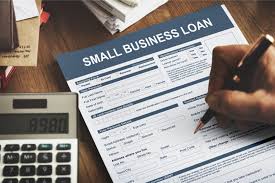6 Tips for Successfully Applying for a Business Loan(1)

A proper schedule and proper preparation are the key to a successful business loan application.
For growing businesses, loans provide the funds necessary to grow their operations, buy real estate and maintain their competitiveness. Therefore, companies must prepare the application in advance in order to obtain timely funds when needed.
Compared to credit cards or other high interest rate debts, traditional bank loans and loans have more flexibility in terms of loan terms, liquidity and interest rates.
The Federal Deposit Insurance Corporation (FDIC) said in a recent report to 1,200 US banks: "The survival and development of small businesses depends on the availability of credit."
If the business owner can prepare the necessary commercial loan documents in advance, this can help speed up the application process. Business owners can use loans for acquisitions or vertical integration to seize business opportunities, capture emerging markets and weaken competition. However, some business owners are very disgusted with debt, which makes them lose the opportunity to grow.
Bank commissioners can provide business owners with ways to improve cash flow and reduce costs. For example, businesses can obtain preferential tax rates by purchasing real estate.
Here are six suggestions that business owners can refer to before applying for an SBA Small Business Administration loan or bank loan.
1. Prepare in advance
Business owners should start preparing 3 months to 1 year before applying for a loan, and the time depends on the purpose of the loan.
Business owners who plan to purchase new or used equipment to grow their existing business should begin preparations 3 to 6 months in advance; business owners planning to buy buildings or other real estate should start preparations 12 months in advance.
Planning ahead gives business owners the opportunity to clear their balance sheets, pay off overdue accounts payable, and other loans. It usually takes 12 to 24 months to pay off debts from banks and other existing lenders.
Banks prefer to see financial statements that show the net worth of the assets of the business, as this indicates that the profits made by the business have not been allocated.
2. Understanding the types of loans
Some business owners have misunderstandings about repaying a loan, so they are cautious about borrowing. Understanding the details of the loan terms and interest rates helps allay the fears of business owners.
When a business is profitable, the business owner should start planning the loan request ... don't wait for income to drop or the business to refuse to apply for the loan.
Long-term loans, such as home loans with repayment periods of 20 to 30 years, or refinancing of current loans, can be a small buffer for the economic cycle. .
Generally, the credit line repayment period is 1 to 3 years and the equipment financing repayment period is 3 to 10 years.
Banking specialists can help business owners simulate and analyze the financing situation and help business owners choose the most appropriate type of loan.
3. Benefits of the SBA (Small Business Administration) loan
The SBA loan is guaranteed by the federal government and has a small down payment, usually between 10% and 15%. It is very attractive to business owners.
Some people mistakenly think that the SBA loan approval process takes a long time, but in fact, the approval time for most of these loans is the same as that of ordinary bank loans.
When you apply for a loan from the SBA
All you need to do is a real estate appraisal or an environmental survey before the loan is approved, while traditional loans may need to be appraised each time they are approved or every 3 to 5 years. The assessment and investigation are both time consuming and costly. The cost of each property assessment and environmental investigation is approximately $ 5,000 to $ 7,000.



